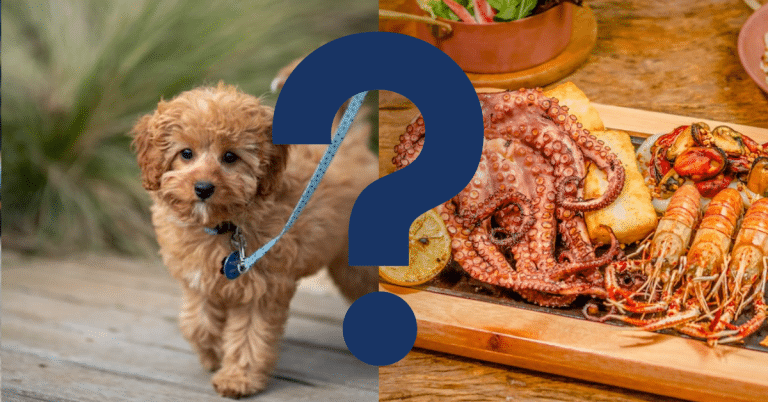Can Dogs Eat Pizza Crust? A Vet’s Opinion

A pizza crust is the base or outer layer of a pizza. It is made from dough and can be thin, thick, stuffed, deep dish, or gluten-free. The crust provides structure and texture to the pizza, serving as a foundation for the toppings, but can you feed Pizza Crust to your dog?
Pizza crusts can be given to dogs as an occasional treat, but it’s essential to ensure they are plain and free from any potentially harmful ingredients like garlic, onions, or excessive salt. Moderation is critical, as pizza crusts are not nutritionally balanced for dogs and may contribute to weight gain or digestive issues if given in excess.
Let’s dive in:
Benefits Of Pizza Crust For Dogs
Pizza Crusts are not nutritionally balanced for canine consumption. However, giving small amounts of plain pizza crusts as an occasional treat may offer some minor benefits. One potential benefit is in terms of bonding and training. Using small pieces of pizza crusts as training treats can be an effective way to reward and reinforce positive behaviour in dogs. By associating the reward of a tasty treat like pizza crusts with desired actions, such as following commands or learning new tricks, you can strengthen the bond between you and your dog while promoting obedience and good behaviour.
Another possible benefit is related to mental stimulation. Chewing on pizza crusts can provide dogs with an outlet for their natural chewing instincts, helping to keep their jaws exercised and their teeth clean. The act of chewing can also provide dogs with a calming and relaxing effect, which can be especially beneficial for dogs who may experience anxiety or boredom. However, it’s essential to supervise your dog while they chew on pizza crusts to ensure they don’t consume large chunks or pose a choking hazard. It’s worth noting that the benefits of feeding pizza crusts to dogs are minimal and should be approached with caution.

How To Safely Give Pizza Crust To Dogs
Feeding pizza crusts to your dog can be done safely by following a few guidelines to prioritize their health and well-being. First and foremost, it is crucial to offer plain and unseasoned pizza crusts to your dog. Avoid crusts with any added toppings, oils, garlic, onions, or other ingredients that can be harmful to dogs. Plain dough without any seasonings or additives is the best option to ensure their safety. When giving pizza crusts to your dog, remember to do so in moderation. Dogs have different nutritional requirements than humans, and pizza crusts are not nutritionally balanced for them. It is crucial to offer only small pieces of crust as an occasional treat and avoid making it a regular part of their diet. This approach helps prevent digestive issues and weight gain.
Supervision is vital when your dog enjoys pizza crusts. It is important to ensure that they are not swallowing large chunks or eating too quickly, as this can lead to choking or gastrointestinal blockages. If your dog tends to eat fast or is prone to gulping food, it is best to break the crust into smaller pieces or consider alternative treats to mitigate any potential risks. Avoid feeding your dog pizza crusts with any toppings, sauces, or dips. Many pizza toppings, such as cheese, meats, or vegetables, may not be suitable for dogs and can cause digestive upset or allergic reactions. It is safest to stick to plain crusts without any additional condiments to avoid any potential issues. Keep in mind that some dogs may have specific allergies or sensitivities to certain ingredients found in pizza crusts, such as wheat or gluten. If your dog has any known food allergies or sensitivities, it is best to avoid feeding them pizza crusts altogether or consult with a veterinarian for guidance on suitable alternatives.
Will Pizza Crust Make A Dog Sick?
Feeding pizza crusts to your dog can make them sick if certain precautions are not taken into account. While pizza crusts may seem harmless, they can pose health risks to dogs due to various factors. One of the main concerns with pizza crusts is the ingredients used to make them. Many pizza crusts contain seasonings, oils, garlic, onions, or other toppings that can be toxic to dogs. Garlic and onions, in particular, can be harmful as they contain compounds that can damage a dog’s red blood cells, leading to a condition called hemolytic anaemia. Some dogs may be more sensitive to these ingredients than others, and even a tiny amount can cause adverse effects. Moreover, the toppings commonly found on pizza crusts, such as cheese, meats, or vegetables, can also be problematic for dogs. Cheese, for example, can be complex for dogs to digest, potentially leading to gastrointestinal upset, diarrhoea, or even pancreatitis if consumed in large quantities. Meats may contain seasoning, spices, or fats that are not suitable for dogs, while certain vegetables can be difficult for them to digest or may cause gastrointestinal distress. The crust itself can also be a concern.
Pizza crusts are typically made with wheat flour, which contains gluten. Some dogs may have sensitivities or allergies to gluten, leading to digestive issues, skin problems, or other allergic reactions. It is important to be aware of any specific dietary restrictions or sensitivities your dog may have and avoid feeding them pizza crusts if necessary. In addition to the ingredients, the size and texture of pizza crusts can pose risks. Dogs may try to swallow large chunks of crust, leading to choking hazards or blockages in their digestive system. Even smaller pieces can cause issues if the dog is a fast eater or tends to gulp their food without proper chewing. If your dog consumes pizza crusts and exhibits symptoms such as vomiting, diarrhoea, abdominal pain, lethargy, loss of appetite, or any other concerning signs, it is essential to contact your veterinarian. They can provide guidance and appropriate medical advice based on your dog’s specific situation. To ensure the safety of your dog, it is best to avoid feeding them pizza crusts altogether or limit their consumption to plain, unseasoned, and small pieces. If you wish to offer treats, there are commercially available dog treats formulated explicitly with safe ingredients and appropriate nutritional profiles for dogs.

Vet’s Summary
It is not recommended to feed pizza crusts to your dog due to potential health risks associated with ingredients, size, and digestion challenges. Pizza crusts often contain harmful ingredients like garlic or onions, and their texture can pose choking hazards. It is safer to opt for dog-friendly treats instead. However, adding probiotics to your dog’s diet can provide benefits such as improved digestion, nutrient absorption, and a strengthened immune system. It is essential to consult with a veterinarian before introducing probiotics to ensure the right supplement and dosage for your dog’s specific needs.
Videos To Watch
If you are wondering what related foods are good to give your dog, watch this:
And if you want to know what a dog can NOT eat, watch this:






